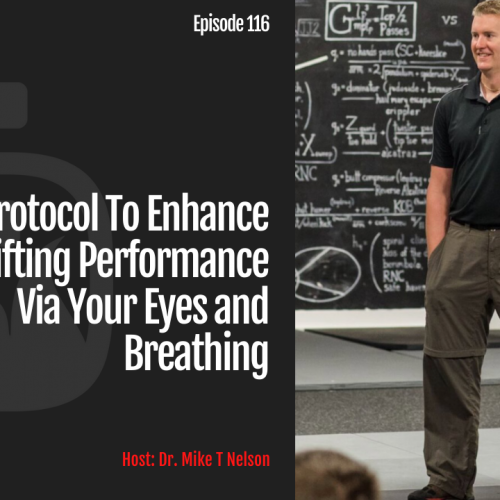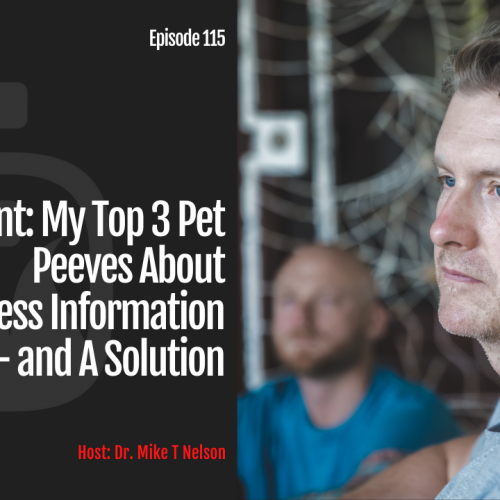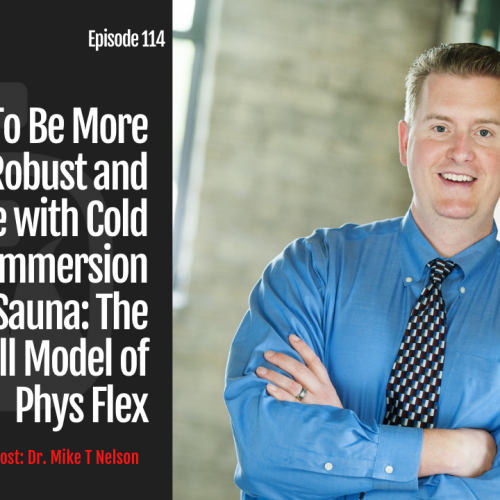Today, I’ve got a big holiday tip for you. Also, stay tuned for many fun guests coming up in the next few weeks! This podcast is sponsored by flexdiet.com. Hop on to join the waitlist, as well as to receive my daily newsletter.
Episode Notes
- How not to gain weight between November and January.
- Two letters: H and H – hedonic and homeostatic
- Awareness
- Combine the best of hedonic and homeostatic
Go to flexdiet.com to get on the newsletter. If you’re listening after Nov. 16, 2020, you can join the waitlist.
Or watch on YouTube:
Rock On!
Dr Mike
P.S. Catch up on any missed Flex Diet Podcasts!
Transcript
Dr. Mike T Nelson (00:00):
Hey, there is dr. Mike T. Nelson here back again with the flex diet podcast. So how to add more muscle and performance improved body comp all without destroying your health and doing it in a flexible manner that fits your lifestyle. And today I’ve got a big holiday tip for you just to solo cast with myself. But stay tuned. We’ve got a bunch of guests scheduled up over the next month or two we’ve got dr. Greg Potter will be on. My buddy is Dean and Jeb will be back on again. You can find a older podcast with them, my man Lee voice, and many others coming up. So stay tuned for those. And as always brought to you by the flux diet certification,uthis will open up again in January, 2021. The meantime you can go to flex diet.com F L E X a D I E t.com hop onto the waitlist to get notified before everybody else.
Speaker 1 (01:16):
That’ll also put you onto the daily newsletter where I have updates for you, they right into your inbox. So the flex diet, as you probably know from the scene to this is eight different interventions centered around nutrition and recovery. We go down a big picture of how to use the concepts of metabolic flexibility and flexible dieting. And we talk about eight of the different interventions and a one-hour technical video. And then I also break down how to specifically use each one of them via five specific action items for eight of the interventions. So it’s a complete system for you to use with your clients for nutrition and recovery. So my big holiday tip for you today has the two letters, H and H if you’ve done the flux diet cert, or if you haven’t yet, you’ll realize that I’m really big on abbreviations and kind of mnemonics like that, so that you can remember stuff a little bit better.
Speaker 1 (02:27):
And also a reminder, most of you probably know this, but most people gain almost all of the weight that they’ll gain over the course of a year from, in, especially in the U S November and December. So even if you can stay weight neutral, or if you’re a coach, have your clients stay weight neutral during this time period, you’re going to be at an advantage come January 1st when everyone’s doing all of the fat loss and composition new year’s resolutions. So this is something I’ve talked about again many times before. So as I’m recording this, we just had Thanksgiving day here in the U S so happy post Thanksgiving to everyone. And we’re coming up on a onslaught of cakes and pies and all sorts of other great holiday cookies. Christmas cookies are some of my favorites. So the two concepts today that will help you out revolve around H and H.
Speaker 1 (03:36):
So the first one is going to be hedonic. So there are two main reasons of why you eat food. Donna just simply means that food tastes good is tasty and eating food because it tastes good. There’s nothing wrong with that. It doesn’t mean you can mainline Krispy Kreme donuts and expect to reach your goals. However, the flip side is also true. If you have a dessert, a bean, a singular dessert, it’s probably not going to ruin your body composition either. And if you are very active, you might get away with more than one dessert even, and this should not ruin all of your progress. So for compliance, as I talk about in the flux diet cert, we’re just generally looking for clients to hit around 90%. Now this is a lot higher than most of where they’re at coming in, but again, it’s not necessarily 100%.
Speaker 1 (04:41):
You don’t need to be quote unquote, perfect all of the time. Then in reality, I actually get worried about clients who tell me that they don’t worry about how food tastes. They’ll just do whatever I tell them to do. Now that may be true, but again, even for the most hardcore competitor, as only going to really be true for a short period of time. So I actually get worried if they don’t put any stock into consuming foods, that taste good. So reason number one, why people consume calories in the form of food is hedonic. Food tastes good. Number two, starting with an H is a homeostatic. Food is needed to run. Your body may need to calories coming in. Now it is true. You can look at fasting. You can look at people who were many hundred pounds overweight doing medically supervised fast.
Speaker 1 (05:39):
The longest one was about a year. But even then you’re still using body fat to fuel your body. Again, I would not recommend that to anyone. So most people are gonna eat, you know, two, three, four, five times per day. Your body needs nutrients, both macro and micro nutrients in order for it to run, right? We have something called a resting or basal metabolic rate. It’s just how many calories you burn, literally only to keep the lights on. So if we measure you in the lab or I have a device here, a piano device to measure this, we want you as close to a resting state as possible, but not sleeping. If you’re watching TV during one of these tests, you’re literally doing too much work. So it’s literally just how many calories you need for your body to stay alive and compared to your total daily energy expenditure, your RMR or resting metabolic rate is around 50%.
Speaker 1 (06:43):
Now that’s going to vary a lot across the board, but as a good portion of it. And then of course we have movement. We have activity. So this adds up to the total daily energy expenditure. And this is a homeostatic thing. We need calories for you to run your body. And neither one of these, both hedonic or homeostatic, you have to respect both of them. This is how your body is wired. And I get worried about clients who are a little bit too far on either end of the spectrum, right? So some clients come in, maybe all hedonic, they’ve never logged a single thing in their life. They have no idea how much protein. They really don’t have any idea of what they’re eating. They go through the process of eating, but it is very subconscious that our awareness is relatively low. Ah, I’ll just eat whatever I see around the tastes.
Speaker 1 (07:40):
Good and not worry about it. Now, sometimes you can get away with doing that. But if you’re trying to make body composition changes, adding awareness to the equation, it’s going to be step one and obviously super helpful. Again, I get worried about clients who are a little bit on the other end of the spectrum. Like I said, who are too much on the homeostatic bro food is just fuel. I don’t worry about how it tastes. So a guy I hung out with many years ago was don’t taste your food, just eat. It was one of his taglines. So again, both of these are going to be important ideally over time because your tastes will change. We want to find something that you will generally enjoy get hedonic benefit from it. And it is also homeostatic. It is the right macro and micro nutrients to run your body and get to the goals that you want to get to.
Speaker 1 (08:40):
And in a quote unquote, perfect world, which doesn’t exist. And an example of better is when these two kind of combine and are more on an unconscious level. So about four years ago, I was the Swiss conference right around this time in Canada was an awesome event. Highly recommend it, if you can never get the chance to go. So we went out to dinner that night. So it was myself dr. John Berardi, who was a co-founder of precision nutrition JL Holdsworth, you probably know from RPR also runs the spot athletics. It’s on a lot of power lifting in the past, plays around with the Thomas inch dumbbell for fun and grip contests. Then also Jeff [inaudible] who runs a bang fitness in Toronto does lifting power lifting BJJ, and also Lauren, who is a massage therapist at jails gym. The spot athletics in Ohio, all of us decided to go out to have a nice dinner.
Speaker 1 (09:45):
And we had big portions of dead animals and some vegetables. And probably to maybe some of your shock, most of us had a beer and dessert. Yes, we had beer, which of course was dark and beer and tasty desserts. And the universe didn’t implode the nursing part was it wasn’t really a big deal. Nobody’s sat there for 20 minutes, him and, and high. And if they should order a beer, should they have cheesecake? It was a pretty easy yes or no decision. And wasn’t a topic of discussion for the next two hours. At all, the only slight debate was JB who was sensitive to lactose and was wondering how much of there was of lactose in the brownie bomb dessert. And if you follow JB stuff, you know that he is a big fan of lactose free ice cream. And the next day, everyone just went back to their normal meal plan.
Speaker 1 (10:45):
You know, no one was upset that they had dessert or a beer, and it wasn’t again, even part of this discussion the next day. So the key part, there is this was done on occasion. This wasn’t something that has done for every single meal of the day. And again, all of the people there have experienced both with the hedonic and the homeostatic side, and it fit within their goals and their lifestyle. And since they have experience doing it, it wasn’t really a big deal. So the takeaway from this is the longterm goal, in my opinion, is not necessarily tracking every macro or micronutrient that comes into your pie hole. Yes. You may need to do this for a period of time. Yes. It can be extremely useful. Yes, I do talk about all sorts of nutrition habits and how to set them up in the flux diets certification.
Speaker 1 (11:46):
But the long-term goal is that you should remain on track towards whatever your goals are with paradoxically, the minimal amount of tracking, it should become more of an unconscious competence. So for example, I was recently in South Padre, Texas my wife and I drove down there and we were hanging out, did some kiteboarding for ended up being about five weeks. The wind was a little bit lighter than what I would’ve liked, but I can’t do anything about that. So I didn’t really kiteboard as much as I normally have in the past. And normally in the past, they end up usually losing a couple pounds in this process. Even though I’ve known to eat pop tarts and drink dark beer after a long, tight boarding session. But during this time, most of my other food is real food. I do have a few more cookies and maybe some day old donuts from the local coffee shop, which were really good, but I’m also outside.
Speaker 1 (12:46):
And I did a short run each morning, my wife and I ended a long walk on the beach since we were right next to the ocean. Most days if they’re wind, I’m going to go out kiteboarding. So I may do one or two sessions of writing and longest session I did this time was a PR of kiteboarding for 60 miles. And that wasn’t even a down winder that was just riding back and forth for three hours and 40 minutes in a row. So I’m getting a lot more activity on top of training a few times a week there, so I can get away with drinking a little bit more beer, having a few more cookies, et cetera. And when I came back, I didn’t log a single thing the entire time I didn’t get on a scale. And I came back and my body weight was literally within one pound of where I left.
Speaker 1 (13:36):
Now. Again, I have the advantage of having run this experiment many, many times. So I have a good idea of what to expect and what habits are the big rocks that I need to do to make sure that this stays in place. So to wrap up, especially around the holiday time even staying neutral with the body weight or body comp is going to be a win, especially for most of your clients. The two main reasons that people consume food is one hedonic with tastes good and too homeostatic. We need food in order to run our body. Both of those are good things. Having a balance between both of them is going to be very useful. Tracking can be a good tool depending upon how it is used. But the end goal shouldn’t be that you have to track everything the entire rest of your life.
Speaker 1 (14:32):
Yes, some people may need a little bit more oversight. There may be things that they need to stay conscious of going forward, but these should be more of a minimal, not a maximum. And again, food is your friend doesn’t necessarily have morality attached to it. So thank you very much for listening to this one greatly appreciate it. If you want more information, the flux site certification opens again in January right now in 2021 will be open on a quarterly basis, go to flex diet.com. You can get on the wait list there and the daily newsletter you can also be added to automatically. So thank you so much greatly. Appreciate it. Talk to you again soon.





